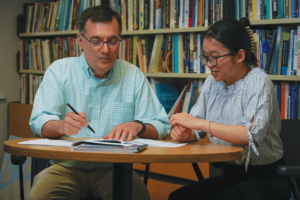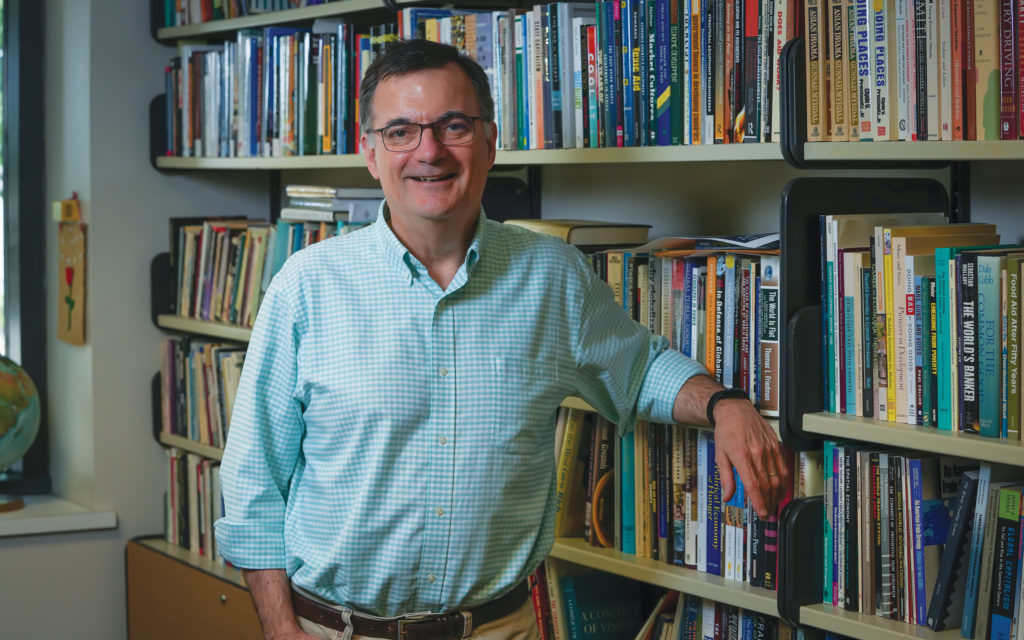
As we have seen amid the recent ongoing horrors in Ukraine, war can have a devastating effect on a nation’s citizens, infrastructure, self-reliance and economy. But what about when the attacks are not external, but internal? Can a country’s level of civil and interpersonal violence, the “everyday” bloodshed we see through the media, have an effect on its trade status with other nations?
Hope Professor of Economics Dr. Stephen Smith thinks it can. And after two years of intense research analyzing data from more than 100 countries, he and his research partner believe they have the breakthrough empirical evidence to prove it.
“For several decades there has been work in economics that has assessed the impact on global trade arising from straight-out war,” Smith said. “And the costs of war in human terms are, of course, almost beyond description. But we wanted to extend that literature and consider how and if what we might call background levels of violence —the kinds of crimes that when linked together would be considered ‘civil violence’ — have an impact on international trade.”
The mind-boggling task of acquiring, collating and comparing 17 years’ worth of recent crime statistics from the majority of countries on Earth — “an extraordinarily large data set,” Smith acknowledged — was aided by two Hope student research assistants and economics majors, Claire Moore ’22 of Springfield, Missouri, in 2021 and Phuong Anh (Jeannie) Vu ’23 from Hanoi, Vietnam, this summer. Meanwhile, Smith’s longtime co-author Dr. Michael Anderson of Washington & Lee University in Virginia was assessing and analyzing the data as well. Both men are members of the Association of Christian Economists, of which Smith is president.
While Smith wanted the study to be more comprehensive, including such crimes as assault, domestic violence and child abuse, for the sake of consistency the focus was narrowed to homicides. “There is just no other measure of civil violence that was as accurately and comprehensively collected across multiple countries and years,” he explained.
“We may yet be able to get some good data on other forms of civil violence, but it’s tricky. The thing about homicide rates is that countries generally report homicides pretty accurately. This is data collected by the United Nations, so it’s considered reasonably good.”
The initial findings? “We do find that there is a statistically significant effect of higher homicide rates on the amount of trade that takes place,” Smith revealed. “Everything else being equal, a country with a higher homicide rate does trade less than another comparable country. To put it technically, we predict that a 1 standard deviation increase in homicide rate per 100,000 people will lower that country’s exports by 5% and lower its imports by 8%.”
“We predict that a 1 standard deviation increase in homicide rate per 100,000 people will lower that country’s exports by 5% and lower its imports by 8%.”
In truth, Smith suspected lower trade figures might be the case at the outset. “It’s one thing to find a statistically significant effect,” he said, “but what really surprised us was how big that effect is. We were also slightly surprised that the effect on imports was higher than the effect on exports. Going into this we were thinking that if a country had a high level of civil violence it might make it harder for that country to organize exports or sales abroad. But it turns out that imports are affected more, and to be honest we’re still trying to figure out why that’s the case.”
The nations studied included the United States, of course, and those findings could be considered surprising as well. “By no means is the U.S. homicide rate low by global standards,” Smith said, trying not to sound obvious. “Over our study’s 17-year span the rate hovered around six homicides per 100,000 people. There’s a whole lot of the world that does a whole lot better than that. Japan. Germany. Most of Europe.
“But that said, amazingly, the global average of homicides per 100,000 is around eight, so the U.S. is actually below the average. And the reason is that there is a group of countries that just have very high homicide rates — El Salvador, for example. Some countries are at more than 60 per 100,000 people.”
The focus for Smith and co-author Anderson this summer is to complete a submittable version of their findings for journal publication. Although this study pushed both professors to learn some of the most recent innovations in empirical economic research, the collaboration itself was far from a new experience.
“We do find that there is a statistically significant effect of higher homicide rates on the amount of trade that takes place. Everything else being equal, a country with a higher homicide rate does trade less than another comparable country.”
“Stephen Smith and I published our first paper together in 1994, and our collaboration has continued unabated to this day,” Anderson said. “Each of us sees our work as economists as part of our Kingdom work. Quite simply, I haven’t met anyone who shares Stephen’s combination of intellectual talent, curiosity, collaborative instincts and absence of pretense.”
Raised in Hong Kong, Smith joined the Hope College Department of Economics and Business in 2016. In 2018 he launched the department’s China May Term, but the travel-study course was derailed two years later due to the pandemic. “We had the honor of being the first Hope College activity canceled because of COVID,” he lamented. “I do hope we can go back. I think the students gain a real sense of another culture and economy, and I always learn a lot as well.”
Prior to coming to Hope, Smith spent nearly 30 years on the faculty at Gordon College in Massachusetts. “I really enjoyed being at Gordon,” he reflected. “It was one of the leading schools in Christian higher education, and a lovely place to be. But in the course of my work there I got to know a lot of economists around the country and came to realize that Hope had a very strong economics and business department full of people who are really good colleagues. When I heard there was an opening at Hope, it was a very attractive place to apply. It was a big move, but it’s been marvelous being here. My wife and I really enjoy West Michigan.”
